Burning CDs and Printing Lyric Sheets for Bob Dylan
Plus how this sound guy introduced Eddie Vedder to Neil Young at Bobfest
Flagging Down the Double E’s is an email newsletter exploring Bob Dylan concerts throughout history. Some installments are free, some for paid subscribers only. Sign up here:
As regular readers know, in addition to the musicians Dylan’s played with, I love talking to behind-the-scenes people on Bob tours. True, their jobs usually don’t involve as much direct interaction with the man himself, but I’m always fascinated to learn how putting on a Dylan show works. Some of the process is just Touring 101—obvious to those who work in the industry, perhaps, but opaque to those of us don’t. Some of the process is, as with anything related to Dylan, idiosyncratic.
Behind-the-scenes people often never been interviewed before, so they have never-told stories to share. I’ve collected some touring-personnel interviews I’m going to roll out over the next few months, starting with this one with Matt Haasch. Haasch was part of the team working the monitors (that is, controlling the sound Dylan and the band heard onstage) from 2010 until mid-2014. He also helped out more informally on a few of the earliest Never Ending Tour shows in the late ‘80s and, notably, at the 30th Anniversary concert aka BobFest.
We talk about all of that, with plenty of detours into touring-life stories about Eddie Vedder, Lou Reed, Jeff Tweedy, and more. As well as just a look at a day in the life of a crew guy on tour with Dylan in the 2010s. Fair warning: This one goes pretty in the weeds into how the whole touring operation works. I love nerding out on this stuff, but if you’re only here for stories of intimate Bob Dylan interactions, this might not be the one for you. (There is a book I might recommend, however…)
Here’s my conversation with soundman Matt Haasch.
You said in an email that like 20 years before you were actually on tour with Dylan, you did occasional things for the early Never Ending Tour.
I would bring out extra PA for East Coast gigs. I remember going to Garden State Art Center with that with extra speakers. Nassau, Hartford Civic Center, Jones Beach sometimes.
Why do they ask you to come with extra gear? Because the venues are bigger than usual?
Bigger or perhaps unusual. Maybe had a unique need for something because it was an abnormally shaped venue. Maybe it was an outside gig and they needed some more power to push farther in a big field.
I remember once, they were rehearsing in the Montana rehearsal spaces in the city. UltraSound East [sound vendor] had provided the gear to that rehearsal, and I was going down at the end of the day to grab all my gear, then they're gonna go off on tour. Bob is in the rehearsal space, maybe with a tour manager. Keith [Dircks, a sound guy then] is like, “Jesus Christ, it's midnight, I gotta go to bed, we're flying in the morning.” He says, “Do me a favor. Go in there and just get a mic cable out of my tech box. That'll flush Bob out.” “Really?” “Yeah, if he sees you come in and he doesn't know you, he'll flip up the hood and out he'll go.” Sure enough, I went in, I took out a couple of cables, and two minutes later out comes Bob with his hood up.
In terms of those early shows, does anything stick out about those little one-offs?
I guess I would say I don't remember them that fondly. Bob had earned the nickname The Scanner, ‘cause he was at that point playing guitar and often looking for chords on the neck.
Just kind of hit a chord and see if it sounds right, and if not hit another one?
Yeah. See if it works or if it doesn't work, “Maybe I'll try and find the right one somewhere.” That's one thing you gotta say about Bob is he knows how to own a mistake, you know what I mean? He knows how to make it work. Not always, but often. I feel almost unworthy to criticize or comment. That being said, I would say that, musically, 2010 to 2014 was on the whole infinitely better than my experience in the brief time I was out there in the late ‘80s. Everything was kind of a mess then.
I also did the Bobfest at the Garden. I was tasked with being the talent stage manager. I was there as a representative of the production to kind of be G.E’.s assistant, whatever he needed, and then also to interface with any visiting talent's requests. So if they wanted something special at the venue, I'd relay that to Al [Santos] and/or Ken [Graham], the stage manager. “So-and-so's asking for their own special amp” or whatever.
That provided me the opportunity to go to rehearsals for this gig, which was fucking incredible. I wanna say we spent about two weeks at SIR downtown. The way they set it up was, each day we would have an artist in the morning and an artist in the afternoon. They would essentially just do their song then fuck off, and, that afternoon, somebody else will come in.
The day that Eddie [Vedder] and Mike McCready came, the only two members of Pearl Jam that actually performed, they came in before Neil Young at SIR. As they're finishing up their rehearsal, in comes Neil Young's longtime guitar tech Larry Craig. He was loading Neil's equipment into the rehearsal space after Eddie and Mike had finished. One of them came up to me and said, “Hey, that looks like Neil Young's stuff.” I’m like, “Yeah, Neil's after you.”
This is 1992. Pearl Jam's not a new thing—they've been invited to this gig obviously—but they're not the top of the heap that they came to be in just a few years. So they're like, “This is incredible, I can't believe Neil Young's here! Oh my God, oh my God.”
I’m like, “Dude, you guys are welcome stay.” “Really?” “Yeah, just lay low, don't be jerk offs.” Mike actually left, so Eddie was there by himself. There was an extra drum set up. Jim Keltner was there [he told me about it here], and there was also a drum kit there for Anton Fig. So Eddie ended up sitting on the spare drum kit watching the whole rehearsal.
He'd never met Neil before? They soon started performing together.
I'm getting goosebumps. So we have Neil's rehearsal. After, Eddie comes over to me. He's like, “Thank you so much. All right, I'm gonna get out of here.” All the artists were staying at the Mayflower. He was going to walk. I was like, “Are you going back to the hotel?” “Yeah.” “What are you talking about? That's like fucking 50 blocks away! This is crazy. We got vans for this.”
I knew the Neil Young guys because of my association with Tracy Chapman. I had met Neil in the past, not that he would have remembered me, but I had toured with Elliott [Roberts, Neil’s longtime manager] 'cause he was taking care of Tracy at that time. I knew they were taking a van back to the hotel. So I went up and said, “Hey guys, can you take Eddie Vedder from Pearl Jam back to the hotel?” “Yeah, sure.”
And Ray, I'm not lying, I literally introduced Eddie Vedder to Neil Young. I was like, “You guys, meet Eddie Vedder. Here's Frank, this is Tim the front of house guy, this is Neil…” So I'm introducing Eddie Vedder to fucking Neil Young.
They became tight quick, I guess. They performed together at the MTV Awards the next year.
The further Eddie Vedder story is, he showed up at SIR with ripped jeans. He came up to me at some point during their rehearsal. “Have you got any gaffers tape?” He turns around, he's got this big hole in his jeans by the back pocket. I’m like, “Fuck dude. Come on.” So he tapes up his jeans, he has his rehearsal, he meets Neil Young.
His jeans were actually ripped, not like grunge-fashion ripped?
No, these were actually ripped. It was not an affectation. His jeans just ripped, he'd worn 'em so long. So I gave him his tape and off he went.
When we get to the Garden, we're doing camera blocking. I'm up on stage, I've got my little run sheets, we're doing our thing. I see Eddie out in the audience watching the rehearsal. He's mouthing to me from 15 rows back, “Have you got any tape?” I was like, “Jesus Christ!” So I throw him some tape, he tapes up his fucking pants again.
Again?
Again!
Then here comes the gig. During the gig, we had a holding area on the stage where the artists would come up 15 minutes before their performance. It was kind of a long time to be waiting on stage, but Bobfest was being paid for by a really early HD television broadcaster in Japan. Because of that, our feet were being held to the fire to stay on time. A really tight clock. My job was to make sure the artists got there in time.
I have two PAs going to the dressing rooms to escort the artists up to the holding pen. One of my PAs comes back: “Eddie's not here.” I'm like, “Holy shit, what? Bring the tour manager.” So [the tour manager] comes up; he's like, “Eddie was in a cab in traffic. He's right now running here.”
As the show is already in progress?
Oh yeah, we're well into the show. I was like, “Dude, I gotta tell Al he's not here." He's like, "No, no, no, he will be here, I promise you. Don't tell on us. He's gonna be here.” Long story short, he showed up in time. And he asked for more tape to tape his fucking pants! At that point, I was like, "Dude, you have enough money, buy some new jeans.”
Another one of my favorite stories from that gig is there was a background singer who was then unknown: Sheryl Crow. She came to most of the rehearsals, just kinda hanging out. She was there in case anybody wanted backup singing during their Dylan song. I met her, we discovered we were both Missouri people, so we became friendly. She was super sweet and was telling me, “Oh yeah, I just did this record with these guys in LA. I'm excited, I think I'm gonna really have a good chance at making this work.” I'm thinking to myself, “Sure, whatever.”
Some random backup singer that no one's heard of.
Yeah. And then just a few months later, within the year, here comes Tuesday Night Music Club. I guess she was right.
I had no idea she was singing at Bobfest. Wonder if she's in any of the video.
I’m sure you could probably see her at something. I mean, you could certainly see me in a lot of video. I am so embarrassed; I wore shorts for that gig. If you think of that set, it was built like a hacienda, kind of a Spanish structure, the clay tile roof. There was a whole hallway behind the band, and then there was a doorway stage left by the monitor positions that all the artists would come out of. There's a few different situations in the show where you can see me standing there. I think Sinéad actually is one of them, where I'm standing there in my dumbass shorts.

Some of the other funny memories, I worked for George Thorogood for a few years. The Thorogood guys came to me and said, “Is there any way that George can meet Bob?” I was like, “Dude, that's a big ask, but I'll try.” So Bob did meet George, and they loved me because of that.
George is one of the people that could not have an amplifier. They weren't even gonna give him an electric guitar. You know how some of these guys are, he's naked without his guitar. So he comes up during the rehearsal, and he's got an acoustic guitar. I ask his guitar tech, “Whose guitar is that? Is that his?” “No, he just grabbed it out of one of the guitar cases over there.” I was like, “Wait, what? Go put it back right now!” Turns out it was George Harrison's.
They did let George [Thorogood] bring his guitar up. He just plugged into an un-miced amp, but at least he could have his guitar physically with him.
Any other individual people you remember standing out from that?
Here's the biggest one. When Sinéad comes, The Pope photo ripping-up has just happened, right? G.E. comes up to me. He says, “Listen, when Sinéad comes, it's all you, dude. I’m out. She fucked me. She made me look like an asshole, 'cause I really tried to get her on Saturday Night Live. I’m not gonna have anything to do with her.” I was like, “Okay, I'll cover it, no problem.”
So she comes in with Phil Ramone, the producer who's helped her put this together. She did rehearsals, sang her song [“I Believe In You”], off she went. And then, of course, at the thing, she gets booed and does Bob Marley’s “War.” Her poor musicians are just sitting there the whole time, not doing anything, just stuck on stage.
Sinéad is now not leaving the stage. To this guy who was managing her, I’m like, “Go get your fucking girl. We gotta keep moving.” He's like a deer in headlights. “I’m not going out there.” ‘Cause his whole world is crashing down, practically speaking. So Kristofferson goes out there, does his thing. “Don't let ‘em fuck with you, you did great, come on out.” Kris got her off the stage.
There's only one set of stairs coming onto that stage, heavily guarded by security. She's now there with her whole little entourage. She's crying, I think she might have thrown up into the trash can. She was just verklempt, and understandably. But she's blocking the stairs up to the stage. People are trying to squeeze by her.
I go to Kristofferson and say, “Listen, you already took a bullet. Is there any way you can get her off the stage?” He looked at me, and I'll never forget it, he goes, “What do you think, I'm fucking crazy?” Kris wasn't gonna go into the fray again. I just laughed. She eventually left.
Any Lou Reed memories? He's one of these guys that stories often come out.
Lou Reed was a fucking asshole.
David Hewitt, the guy who recorded that gig, made a request that everybody use the same kind of vocal mic. It’s not an unusual quest for a recording truck to make, for continuity’s sake. And I made that request of Lou during rehearsals. He turned to me and said, "If there's any other microphone than an SM58 in my mic stand when I go out to perform, I will unplug it and plug in mine.” I might've even said, "Would you even try for rehearsal?” “Not gonna happen.” Okay, whatever dude, thanks for the team effort.
I've got a Reed story for you from my time working with Primus. We did a festival in Australia in the mid-’90s. You do three gigs, in Sydney, Brisbane, Melbourne. The headline act is Nine Inch Nails, the second-to-last is Faith No More, the third-to-last is Primus, the fourth to last is Lou Reed, by himself. The weirdest booking ever.
This was set up as one of those festivals where instead of having a rotating stage, they're doing two stages. While one act is performing, next to them they're setting up the other act. As an audience member, you go back and forth.
Lou Reed is out there playing his thing. The kids, not surprisingly, are not that into Lou Reed. I don't know how much you know about Primus, but the kids have a chant that was originated by the leader of the band, Les Claypool: “Primus sucks.” So towards the end of Lou’s gig, the kids are starting to chant, “Primus sucks, Primus sucks” while Lou's still playing. Inconsiderate thing for the kids to do. It happens.
So he goes off and he complains—not about them saying “Primus sucks,” but that while we were setting up and doing our line check, we were too loud. The guys doing the festival come to us and they're like, “Listen, we're getting complaints from Lou's people that you guys are making too much noise. We know you weren't, but whatever you can do to help us out.” Yeah, sure. We made an effort to be even quieter.
The second gig, Lou complains again. Like, Jesus fucking Christ, what's wrong with this guy? We were silent! We go to the third gig, same thing, he complains again.
Chuggy, one of the rapscallions from the promoting company, knowing me and a couple of the other guys, tells us, “Make sure that you're in your dressing room area after Lou comes off. It's gonna be worth it.” So we tell everybody in the band, something's gonna happen during this break. We're standing there in that trailer compound area. Sure enough, Chuggy throws Lou Reed out of the venue. Out comes the bus tray flying out onto the grass. Out comes a table flying. “Get the fuck out of here, don't ever come back, you ungrateful old fucking junkie, blah blah blah.”
It turns out what had thrown Lou, poor guy, was there was, like at many of these festivals, a separate second stage. So he wasn't hearing the crew for Primus getting ready; he was hearing these other bands out in the woods or in the parking lot an eighth of a mile away. But he was complaining about us. I'm a fan of him musically, but he could be a real jerk. Mind you, I've had friends that worked for him who would walk through fire for him. I think he was one of those people that was very loyal to his people. If you weren't in his circle, you're screwed.
So then, almost 20 years after Bobfest, how do you join the touring crew in 2010?
I worked for UltraSound for pretty much all of my career. UltraSound came in as the sound vendor for Dylan at the beginning of that Never Ending Tour, but at some point Dylan had been lost [as a client]. He was with Clare Brothers for a long time. I want to say 2009, something like that, Dylan was going to go back to UltraSound. I get a cryptic text from Derek Featherstone, who's now running UltraSound. It just said, “Dylan in August?”
I was brought in as the assistant monitor tech. I ended up getting into that monitor seat when Jules [Aerts, Dylan’s longtime monitor engineer] was getting sick. I actually knew Tony [Garnier]. I had worked at a recording studio called Intergalactic Studios on 48th Street. Tony used to come in there as a session guy. When I re-joined I was like, "Hey, Tony, you may not remember, but we met at Intergalactic.” Tony was a motorcycle guy and I was a motorcycle guy, so we became friends.
Any memorable shows or tours from your years on the road?
I had toured with Uncle Tupelo. In fact, as I recall Uncle Tupelo and The Band had been scheduled to play at Bobfest together, but they were out on a tour. I've been a big fan of Wilco since the very beginning, and I had been telling Al for literally a decade or more get Wilco as an opening act. I even said something to Dylan’s booking agent at some point. Then during Americanarama [2013 summer tour when Wilco opened for Dylan], I saw he was at a gig. I’m like, “Dude, it's about time!”
I think probably more than half of the shows, Jeff Tweedy would bring a chair out to sit next to me and watch Dylan from the monitor position, which nobody else was allowed to do. He came out to sing with Dylan some nights. One night all three of the openers came out: Jeff, Jim James from My Morning Jacket, and Ryan Bingham. And for the introduction Bob said, if I remember right, “I got some friends coming out to play with me. Jeff and Ryan and…this guy.”
Wilco crowned My Morning Jacket “My Boring Racket,” which I have to confess I did not disagree with.
Bob Weir was on a few of those Americanarama shows too. You mentioned you worked with the Dead.
I did the 50th anniversary thing in Chicago and Santa Clara. One of the nights Derek and I were leaving Santa Clara after production rehearsals, probably the day before the band's gonna show up, and in comes this massive vehicle called an EarthRoamer. It's like a $500,000 car, ready to drive across the savanna of Africa. And I'm kind of a four-wheel-drive car guy, so I'm walking by it, ogling it, and the window rolls down. The driver says, “Do you like it?” I walk over, and it's John Mayer.
Derek and I go to drive back to the hotel. Derek’s like, “You can't tell anybody, but next summer, there might be a Grateful Dead thing happening, and John is gonna be the guitar player.” Sure enough, there I am next summer, out on tour with Dead and Company.
What do you remember about the Dylan rehearsals when you first joined?
The thing about rehearsals is Bob's not talking to a lot of people. I knew that going in. It was all business. He’d do his thing, then he'd leave and we'd mark cables that we needed to mark or whatever. Every rehearsal, every show, was recorded by DAT tapes at the monitor position. Years of those tapes were archived and ready for him to say, “Hey, can you get me the rehearsal from three years ago in Shelburne, Vermont?”
Did he ever actually ask for that?
Absolutely. And you'd go looking through the two drawers with all the DAT tapes, which you would have a few years back.
You’re hauling all these DAT tapes around on the road?
Yeah. It was a big road case full of tapes. I think they're now digitally recording, but during that era, it was all DAT tapes. These are not the tapes that are being archived for any front-of-house recordings. These are just being kept for Bob's use during soundchecks and rehearsals. You record the shows, you label them, you put them in the box. You might never see them again or you might be asked for them in a week.
So what happens when he asks to hear tapes during soundcheck?
You go find them and then you play them to the band through the monitor system. He'll point out that one aspect of that particular song that he wanted to incorporate into a rendition of a different song, or a certain instrumentation or feel he liked. Stuff like that. You could also be asked to bring up an old version of, I don’t know, Blind Willie McGee's “I Dropped My Broom in the Bar.” And you'd find some old recording on YouTube and play that for the band.
Eventually, he became more comfortable with me and did talk to me, but early on, I could see him looking at me, then he’d turn to Tony and go mumble mumble. And Tony would say, “Hey Matt, can you find Blind Willie McGee's version of ‘I Dropped My Broom in the Bar’?” I'd find it and then I'd give Tony the sign when I had it ready to play, and he'd say, “Matt's got that ready.”
Early on you had to talk through Tony?
Bob's not the guy that's gonna yell across the stage. I’m like 20 feet away. It was more convenient for him to say something to Tony.
What do Bob and the various band member want to hear in their monitors? I know stage-monitor sound is not the same as what the audience hears.
Most of the people wanted to hear Bob. That was the most important thing. Unlike a lot of bands, where most members wanna hear themselves. These guys wanna hear some aspect of Bob's playing, and maybe a hi-hat or a kick drum for rhythm. It was mostly about his vocal and piano. He never played a guitar when I was there; he played that organ, the piano and the harp. I have a couple of harmonicas in my drawer from Bob that I keep as a memento for myself. Al would give those away to very close friends or luminaries. They've got their little B-flat white gaffer's tape on them so we can see them in the dark.
What does Bob himself wanna hear in his monitor?
Bob was from the school that he wants to hear what's coming back from the room. I think a lot of folk musicians come up hearing the PA bounce back at them in smaller venues. That's what they're used to and get acclimated to over years of performing at smaller things. Tracy Chapman was the same. Monitors weren't a big thing when Bob was starting; they became a thing in the late '70s and '80s, and one could argue that they weren't even that good then.
So are you saying basically that he wanted to hear what the audience was hearing?
It’s not that they're necessarily hearing what the audience is hearing, literally. Like, working with the Grateful Dead, they have this theory that they wanna hear exactly what the audience is hearing. Well, for a lot of sound reasons, that often can't happen. Especially as you get into these bigger multi-purpose venues, arenas and certainly stadiums, there's not a lot coming back except the unpleasant stuff, feedback. So then you’re gonna have to lean on your monitors and all these other things that let you hear a house mix. But when the rubber hits the road, most musicians don't wanna hear the house mix, 'cause they're not featured in it. It's not necessarily what they need to hear to do their job. A given guitar player might need to hear the other guitar player more than anything, so they're not conflicting musically.
One day, after the soundcheck, one of Bob’s techs says to me, “You need to turn the piano down. It’s too loud.” I was like, “I don't know, Bob didn't say anything…” “Turn it down.” So I stupidly turned it down. Bob came out and started playing. He turned to me, and oh my God did he give me a scowl. I turned up the piano, and all was right. I was thinking, “Dude, you fucking screwed me.”
Eventually Bob stopped talking through Tony and would talk to you?
Bob certainly became more comfortable with me over time. I will say this about me, I'm not the best monitor guy that's out there. There's a lot of better monitor guys than me. My strength as a monitor guy was the mental game, the relationship with the musician. Because if a musician has confidence in you, that you're gonna give them what they need, that's the best thing for a monitor guy to be. If they look at you during the gig, and you're reading a book or looking off stage, that's not good.
The first time that Bob spoke directly to me, we’re doing a soundcheck. He walks into the building, goes up on stage, I start the DAT tape rolling. He came up with some idea on the piano. He turned around to me after his noodling and goes, “Did you get that?”
When we finish rehearsal, off he went. Barron, one of the security guys, comes back to me. Barron says, “Make a CD of that for Bob.” Okay. I knew about that process, that I had to burn a CD of whatever they requested and then send it off to Bob. He would listen to it on the boombox on the bus or in the dressing room.
Do you remember what it was that he was so excited about?
Just something on a piano. Some idea that he liked. He wanted to listen back and see if it was credible.
Is he showing up for soundcheck every day?
More often than not. Because a lot of times, he's in the bus on site.
Doesn't have anything else to do. He's not hitting a restaurant in town.
Or a vacant house he can go get arrested by.
Another time that Bob talked to me, July 2014, we were headed towards Pori Jazz Festival in Finland, where we were gonna finish the tour. The gig before Pori was an outside gig in Scandinavia somewhere. It's a rainy, misty day. We set up, we soundcheck, Bob's gonna arrive anytime. I'm up on stage.
At beginning of that tour, Jules was obviously not doing well. Al came to me during that tour saying, “You're the new guy.” I'm like, “No, no, no, I'm not the new guy. I have a union job, I have benefits, I'm doing post-production. I'm happy to help out when I can, but I'm not the new guy.” Because you have to turn your life over to it pretty much. I'm not trying to be Bob's monitor guy for the next ten years. But everybody thinks I'm the new guy. They’re all like, “Congratulations!” I was like “Oh thanks…” ‘Cause in that camp, you don't contradict what the camp thinks.
So here we are at this venue. Bob's arriving. And son of a bitch if Bob does not walk up the stairs, walk right over to me, and say, ‘Hey, what's going on?”
I said, “Oh, nothing, kind of a rainy day, but your position is dry…” He’s like, “Cool. All right, talk to you later.” And he walked over to the other side of the stage to talk to Tony.
Everybody on the deck is like bursting. Not visibly to Bob, but getting my eye. They're giving me the thumbs up, waving, everybody's excited. “He spoke to Matt! He spoke to Matt!”
At that time, on that leg, we were using multiple vocal mics. There was the mic at center that he was using; that was the only one that was actually plugged into anything. It’s funny, you go online and people are like, “Oh, they're using those for surround recordings” or whatever. Every theory ever heard of. It was just a whim. A visual thing that he wanted to do for whatever reason. We called it The Press Conference.
So everybody's rejoicing 'cause Bob's finally spoken to Matt. And, you know, maybe I'm feeling my oats a little bit. So I grab one of the classic RCA old broadcast mics. Bob's over talking to Tony or somebody. I walk over and say, “Hey, do you want these for soundcheck?” He’s like, “No, just for the show,” and I walked away. I was like, look at that shit. I just went and talked to Bob on my own. Like a big boy. [laughs]
What were your other responsibilities?
The lyric sheets. There were these laminated song sheets that weren't the whole song necessarily, but just the key lines in case he wanted to remember how to start it or whatever. It was the monitor guy's responsibility to keep those in that same road case where the tapes were. You'd get a set list a little bit before the show, and you'd go pull all of the lyric sheets that you had lyrics for.
Do you have lyrics for his entire catalog just in case, or just songs he's played in the last year or two?
I honestly have no idea how many lyric sheets there were. Certainly not his whole songbook. Probably just what he's performing at a given time. I don't think they'd ever throw any of them away, but he might come and ask for new lyrics to be made for something he’s gonna start doing. The piano had the lyric sheets right on the top deck with his little glow light.
As long as we're on nerdy paper-related questions, who writes out the setlists?
I think it was Tony who would report the setlist to Al; Al would print it out and distribute it. Then Al would come collect it after the show, because the monitor guy's job was to actually correct the set list. If a song was omitted, scratch it out. If the song was added, write it in. Then Al would come get it.
For what purpose?
I'm assuming it went up on the website.
Are there any other particularly memorable shows, venues?
The Brickyard in Kingston. It's the remnants of an old brick yard on the Hudson River where some deep-pocketed person has set up this destination venue. Al calls and says, “We’re getting ready to go to Hutton Brickyards. Can you go take a look at that?” It was local for me, near where I live. I remember telling them, “Listen, the most important thing for success at this gig for you is the bus has gotta be right by the stage.”
So Bob can get to and from the stage without anyone seeing him basically?
Yeah.
That organization is unlike any other. It’s as unique as the Grateful Dead organization; the mold was broken for both of those camps. It's a good bunch of people. Al taught me a valuable lesson. When he was gonna hire me to become Tracy's production manager, he came to me and said, “If you were gonna hire a crew, who would you hire?” I said, “I would probably hire people that do what I said.” He said, “That's exactly the wrong answer. Come to me when you got the right one.”
So I thought about it and thought about it. Eventually, [I went back to Al] and I said, “You hire the people that are best at their jobs, so you don't have to worry about them. They’ll do their jobs, and you just put out the fires.”
That was it. It was some of the best advice. Literally life advice, not just in the context of a rock and roll tour. Get people in that know how to do it and let them do their thing.
Why else was the Dylan operation unusual compared to other offices you've worked with?
Like every organization, everything comes from the top. Mood and temperament and flavor, for lack of a better word. When your leader is, essentially to all of us on the team, pretty non-communicative, it can be stressful. And specifically in my case, a monitor mixer would usually actually talk to the person you're working for. And that's just not the case there.
When you're supposed to do sound for someone, but you're not allowed to ask that someone how he wants it to sound.
I mean, no one ever tells you can't speak to Bob. It's not like all these stories with big stars where someone says, “Don't look him in the eye. Don't talk to him.” It just already exists. You enter that world and that's the way it is. Pretty quickly, you notice that other people on the crew are not speaking to Bob and you take your cues from there.
I remember going to the Hollywood Bowl. Someone came up to me said, “Bob's sons are going to be here tonight, so they're going to be hanging out with you in your area.” Of course in my mind, I'm thinking Jakob, Jesse. I'm imagining these like 30-year-old sons are going to show up. And here comes teenagers, maybe pre-teens. I was like, “Who are these kids? What's happening here?”
It just goes to show you how close to the bone he keeps things. You just don't know anything about him. Nobody in the crew knows what's going on in Bob's life. I don't even know if those were really his kids. It could have been a ruse.
I always admired his desire to just fuck with people. You know, almost the prankster element of him. I really admire it, but I can understand why so many people find it frustrating to go to the show and not recognize a song. At some point during my tenure, he said to somebody in the production, “I’m not here to entertain these people.” It made sense once I heard it. Some aspect of this is for him. It's what he likes to do. “I’m not here to entertain them.”
He works hard. He doesn’t need the money. I know about more about Weir than I know about Dylan, and I don't think he likes to be home. Weir likes to be out playing music and living that life. And I assume Dylan is the same way. That's the life he's choosing to live, to be out on tour.
Thanks to Matt Haasch for taking the time to tell his stories! See below to links to some more behind-the-scenes Bob stories from non-musician tour personnel. And here’s the “Bob talked to Matt!” show:
2014-07-15, Tradgardsforeningen, Gothenburg, Sweden
Rolling Thunder '76 Soundman Talks Touring with Bob Dylan
Earlier this year, I was poking around setlist.fm and came across an unusual comment on a Rolling Thunder 1976 setlist. It had been posted way back in 2015. It read, in part, “I was the audio engineer for this portion of the Rolling Thunder Revue tour. While I do not have a complete setlist…
Tour Manager Richard Fernandez Talks Life on the Road with Bob Dylan and Tom Petty
In a career spanning five decades and counting, Richard Fernandez has served as tour manager for too many iconic artists to name. When he won the concert industry’s highest award in 2016, Graham Nash said, “When musicians are out on ‘the proud highway,’ we need all the help we can get. The secret…
Richard Alderson on Recording Dylan's Gaslight and 1966 Shows
“Most people identify me with Dylan,” Richard Alderson says, despite his work with Dylan only being a blip in a long career. Two blips, actually: He first recorded the famous Gaslight 1962 show and then toured as Dylan’s sound engineer in 1966. You wouldn’t have heard “Judas!” without…
Mike Evans, Bob Dylan's "Big Police," Talks Security and Food Fights on Rolling Thunder
In Renaldo and Clara, Bob Dylan’s movie documenting the 1975 Rolling Thunder tour, Mike Evans’ team gets credited as “Big Police.” Promoter Barry Imhoff gave them the “Masterpiece”-nodding nickname due to their role overseeing security for Dylan and the musicians…
Stories from Bob Dylan's First Never Ending Tour Sound Crew
I spoke to Dylan’s sound guys from those days: David Robb, who did the sound the audience heard; Keith Dircks, who did the sound the band heard, and Robert “Fuzzy” Frazer, who got the gear from place to place and helped with mics…

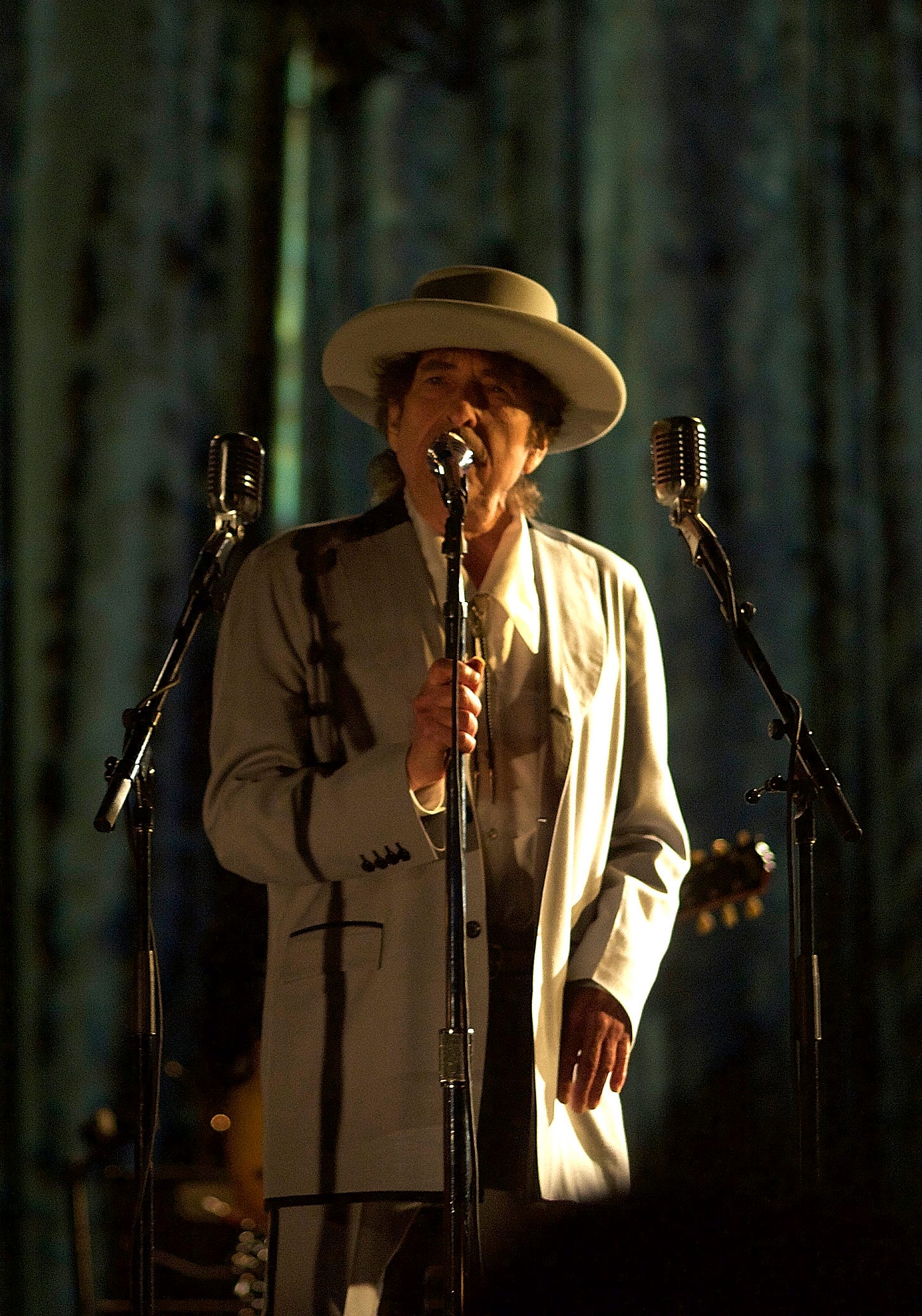


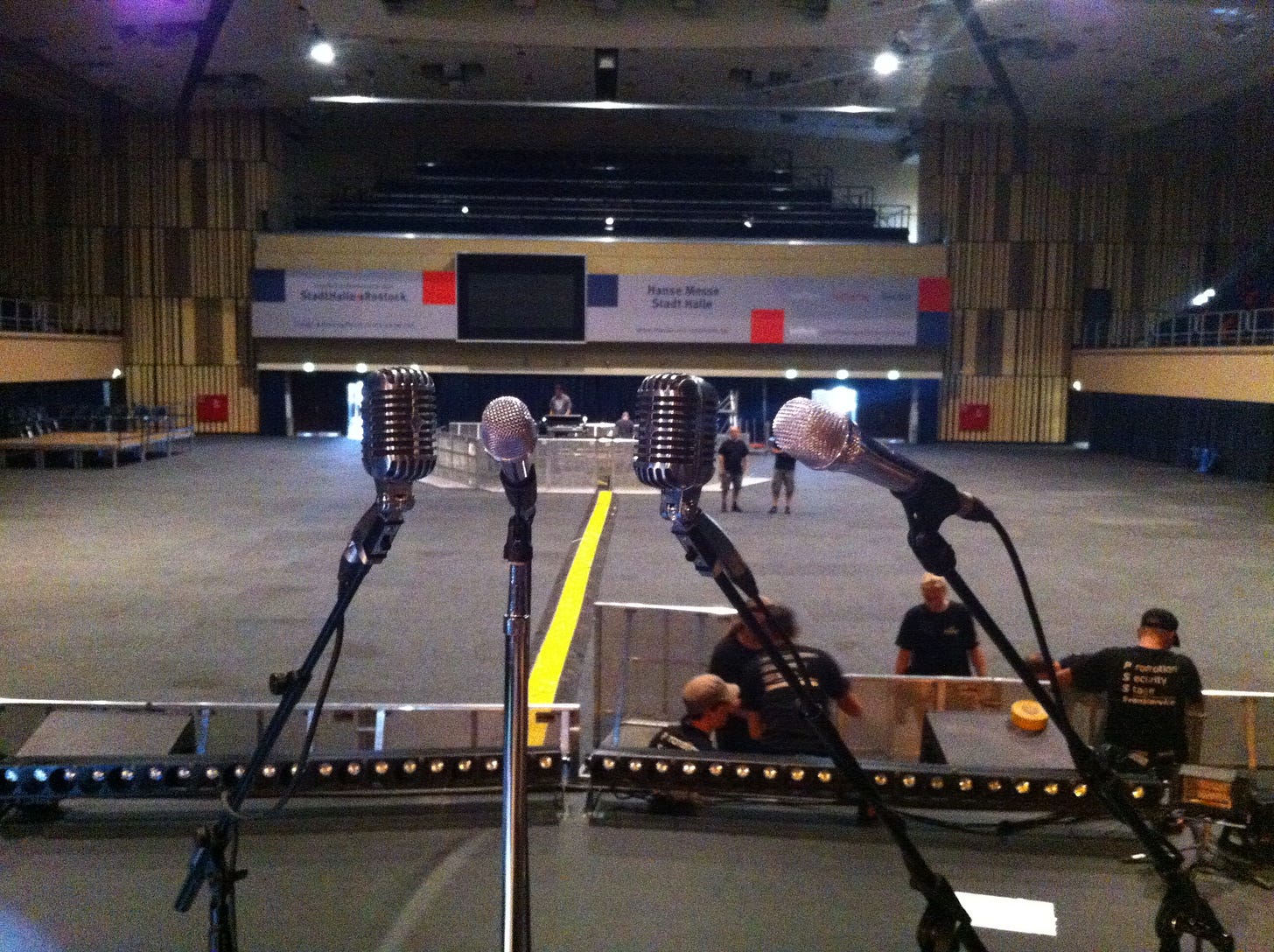
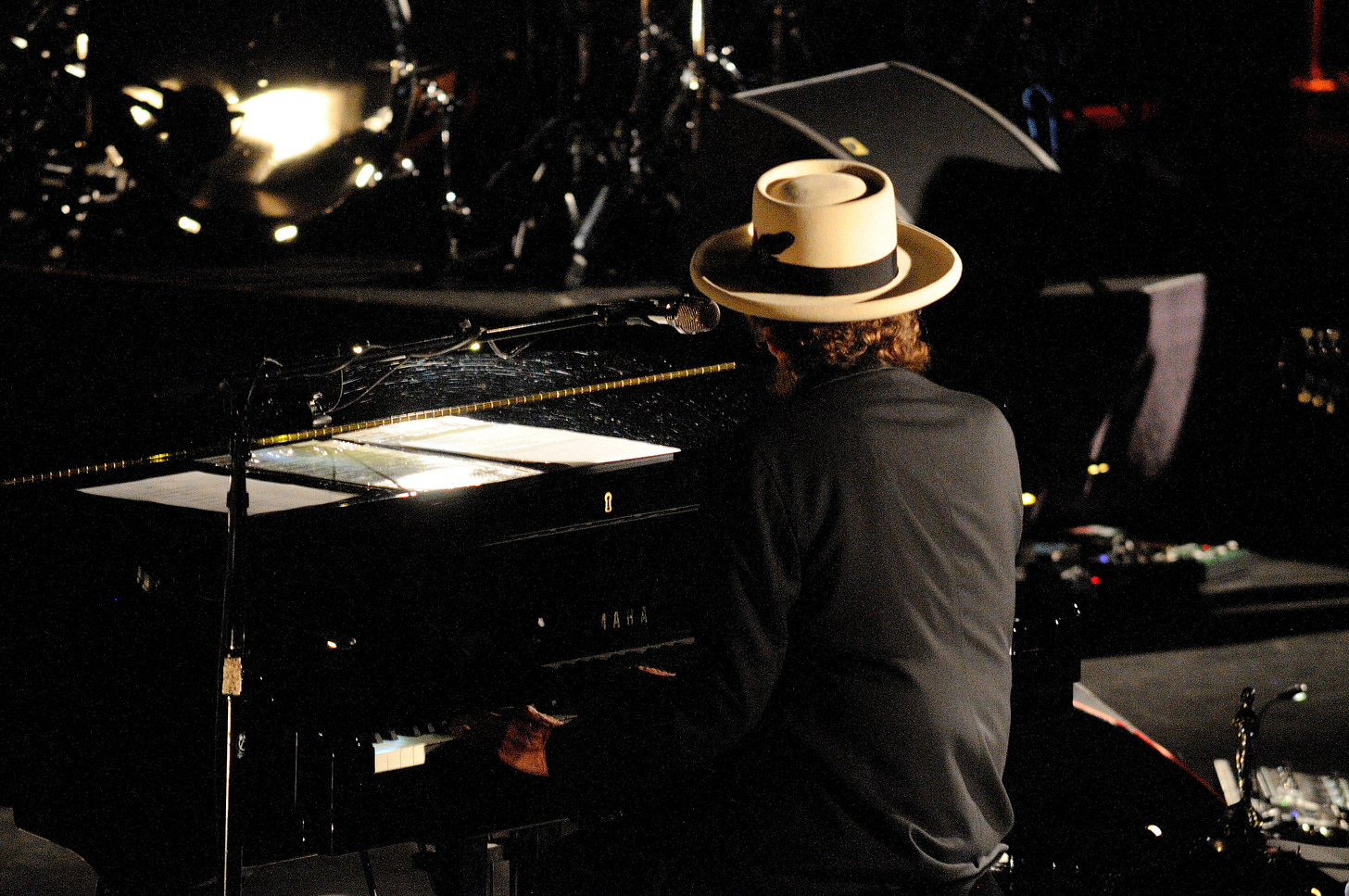
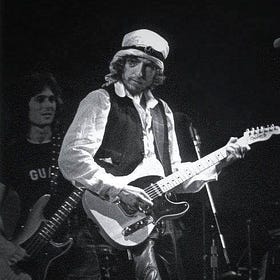
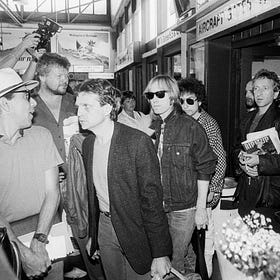

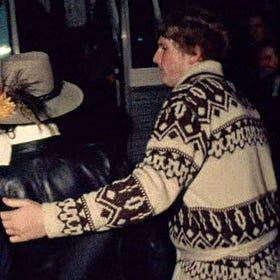
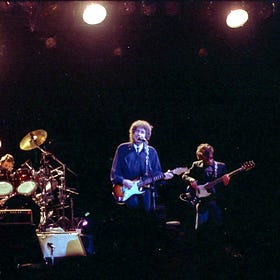
One of the best behind-the-scenes interviews I've read. So many cool details!
I found this a really interesting interview. Great stuff. The part about the DAT tapes, the playing of the recordings of old songs for Bob, the sound Bob and the band hearing, 'The Press Conference' mics, lots of good stuff, told in a cool way. Thanks to you both!.